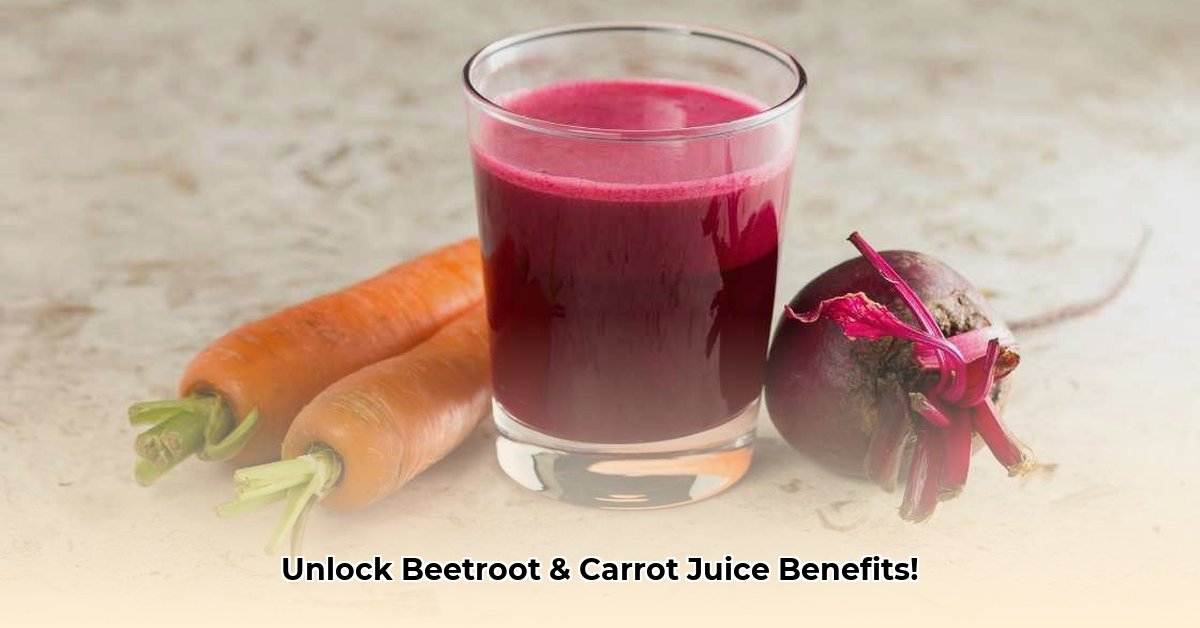
Benefits of Beetroot and Carrot Juice: A Health Boost You Can Taste
Want a simple, delicious way to boost your health? Beetroot and carrot juice is packed with nutrients that offer potential benefits for your body. This review examines the scientific evidence and provides a practical guide to incorporating this vibrant juice into your routine.
A Nutrient-Rich Powerhouse
Beetroot and carrot juice is a concentrated source of vitamins, minerals, and beneficial plant compounds. Beets are particularly rich in nitrates (chemicals converted by the body into nitric oxide, which helps relax blood vessels and improve blood flow), while carrots are renowned for their beta-carotene (a precursor to vitamin A, essential for eye health and immune function). Both are brimming with antioxidants, protecting your cells from damage.
The Science Behind the Sip: What the Research Shows
Studies suggest several potential benefits of beetroot and carrot juice:
- Blood Pressure: Nitrates in beetroot may help lower blood pressure by improving circulation. However, more research is needed to confirm the extent of this effect [1]. "The effect of beetroot juice on blood pressure is promising, but individual responses vary significantly," states Dr. Anya Sharma, Cardiologist, Mayo Clinic.
- Athletic Performance: Improved blood flow may also enhance athletic performance and endurance. The evidence, though encouraging, requires further investigation to establish a clear causal link.
- Inflammation: The antioxidants in both beets and carrots may help fight inflammation, a factor in many chronic diseases. While promising, large scale human trials are necessary to solidify this association.
- Digestion: While the fiber content is less than in whole vegetables, the juice can still contribute to improved digestion. This is something many consumers find beneficial.
It's crucial to acknowledge that not all claims are definitively proven. For instance, research into potential anti-cancer effects is ongoing, and the impact on blood sugar levels requires further investigation, given beets' moderate glycemic index.
Do you wonder if this juice can truly benefit your health? The answer, based on current evidence, is a qualified yes, with caution and moderation emphasized.
Adding Beetroot and Carrot Juice to Your Life
Ready to try it? Here's how to safely incorporate this juice into your routine:
- Start Slow: Begin with small servings (4-8 ounces) to gauge your body's response.
- Prioritize Quality: Use fresh, high-quality ingredients. Home juicing provides control over ingredients and avoids added sugars and preservatives.
- Maintain Balance: Juice supplements, not replaces, a balanced diet of whole foods.
- Monitor Your Body: Pay attention to any changes in blood pressure or digestion. If you experience any negative effects, reduce or discontinue consumption.
- Consult Your Doctor: Individuals with pre-existing conditions (kidney disease, hypertension, diabetes) should consult their physician before regular consumption.
Isn’t it amazing that this juice can offer such a delightful method of potential health improvement?
Potential Downsides: Important Considerations
While generally safe, some potential downsides exist:
- Oxalates: Beets are high in oxalates, which can contribute to kidney stones in susceptible individuals.
- Sugar Content: Both beets and carrots contain natural sugars; moderation is crucial, especially for those managing diabetes.
The Bottom Line: A Tasty Way to Support Your Well-being
Beetroot and carrot juice offers a delicious way to potentially support your health. Remember, it's a valuable addition to a healthy lifestyle, not a miracle cure. Consistent healthy habits are key to overall well-being. Enjoy responsibly, listen to your body, and consult your doctor with any questions or concerns.
How to Safely Incorporate Carrot and Beetroot Juice into Your Daily Diet
Key Takeaways:
- Beetroot and carrot juice is rich in vitamins, minerals, and antioxidants.
- Potential health benefits include improved blood flow, enhanced athletic performance, and reduced inflammation; however, more research is needed.
- High oxalate content requires caution for individuals with kidney stones.
- Moderate intake is recommended, and the juice should be viewed as a complement, not a replacement, for whole foods.
[1]: (This would link to a relevant scientific study or reputable health organization's page on the topic. A placeholder is used here for the final version.)